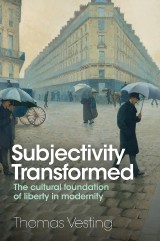Details

Subjectivity Transformed
The Cultural Foundation of Liberty in Modernity1. Aufl.
|
17,99 € |
|
| Verlag: | Wiley |
| Format: | EPUB |
| Veröffentl.: | 28.11.2023 |
| ISBN/EAN: | 9781509553372 |
| Sprache: | englisch |
| Anzahl Seiten: | 288 |
DRM-geschütztes eBook, Sie benötigen z.B. Adobe Digital Editions und eine Adobe ID zum Lesen.
Beschreibungen
<p>This book provides a historically informed reconstruction of the social practices that have shaped the formation of the modern subject from the early modern period to the present. The formal legal protections accorded to subjects are, and always have been, latent in social practices, norms, and language before they are articulated in formal legal orders. </p> <p>Vesting argues that in Western societies legal personhood is closely tied to three ideal types of social personhood – what he calls the gentleman, the manager, and <i>Homo digitalis</i>. By examining these three ideal types and their emergence in society, we can see that Western formal law does not bring these ideal types into being but, on the contrary, they arise from the social and cultural conditions that they generate and reflect. Correspondingly, Western legal personhood, or “legal subjectivity,” arises from the history and culture of Western nations, not the other way around. Therefore, signature features of Western formal law, particularly its valorization of the rights of persons (whether natural or nonnatural), come from the particular sociohistorical cultural developments that had already generated the strong ideas of social personhood inherent in the ideal types of the gentleman, the manager, and <i>Homo digitalis</i>.</p> <p><i>Subjectivity Transformed</i> is a major contribution to legal and social theory and, with its original analysis of the formation of modern subjectivity, it will be of interest to students and scholars throughout the social sciences and humanities.</p>
List of Figures<br /><br /><br />Preface<br /><br /><br />§ 1 Introduction<br /><br />§ 2 Instituting Power<br /><br />§ 3 Culture as an Orientation-Forming Symbol System<br /><br /> I. The Universalist Heritage of Cultural Theory<br /><br /> II. The Dual Character of Modern Culture<br /><br /> III. The Challenge of Information Technology<br /><br />§ 4 Creative Freedom as a Source of Cultural Dynamics<br /><br /> I. Transsubjective Conditions of Subjectivity<br /><br />II. Imagination as Poetic Mimesis<br /><br />III. On the Event Character of the New<br /><br />§ 5 Bourgeois Culture<br /><br />I. The Gentleman as a Personality Ideal<br /><br />II. The Technical Attitude to the World<br /><br />1. The Early Modern Era as a Foundational Phase of Disruption<br /><br />2. Fulfillment through Tireless Effort?<br /><br />III. The Social Body and the Body Politic<br /><br />IV. Formation of the Subject – In the Mirror of Society<br /><br />V. Legal Subjectivity and the Practices of Liberty Instituted in Society<br /><br />VI. The Alien Claim and Disciplining Subjectification<br /><br />§ 6 The Anglo-American Variant: The Gentleman<br /><br /> I. Experimental Thinking and Useful Knowledge<br /><br />II. Sociability and Other Virtues<br /><br />III. The Mirror of Society Becomes Better Endowed<br /><br />IV. Inclusive Institutions and Instituting Power<br /><br />§ 7 The Continental Variant: Honnête homme and Bildungsbürger<br /><br />I. The Sophisticated World of the Paris Salons<br /><br />II. The German Bildungsroman<br /><br />III. Subjectification as Subjugation and Empowerment<br /><br />1. Invocation and Subjugation<br /><br />2. Empowerment by Means of the State<br /><br />§ 8 Managerial Culture<br /><br /> I. The Rise of Large-Scale Enterprises<br /><br />II. The Research and Development Laboratory<br /><br />III. Trust between Strangers<br /><br /> 1. The Legacy of Spontaneous Sociability<br /><br />2. From the Inner-Directed to the Other-Directed Individual?<br /><br />IV. Managers in America and Germany<br /><br />1. The American Manager<br /><br />2. Senior Executives in Germany<br /><br />V. Annex: Images of Corporate Bodies<br /><br />§ 9 The Culture of Information Technology<br /><br />I. Homo Digitalis and the Theory of the Network Society<br /><br />II. The Regional High-Tech Cluster<br /><br />III. The Organization of Economic Production<br /><br />1. Dissolution of Conventional Corporate Boundaries<br /><br />2. Collective Learning through Informal Institutions<br /><br />3. Continuous Experimentation: New Contract Models<br /><br />IV. On the Environmentalization of Legal Subjectivity<br /><br />1. Paradigms of the Development of Technology<br /><br />2. On the Intelligibility of IT Milieus<br /><br />3. The Ecotechnological Dimension<br /><br />V. The Relevance of Instituting Power<br /><br />§ 10 Epilogue<br /><br /><br /><br />References<br /><br />Notes<br /><br />Index
“In this highly original work the author sets out several ideal types of modern individuals and shows how each responds to a world of social and technological change. This thought-provoking analysis will be vital for academics and policy-makers alike.”<br /><b>Lawrence Rosen, Princeton University</b>
<b>Thomas Vesting</b> is Professor of Law at Goethe University Frankfurt.

















